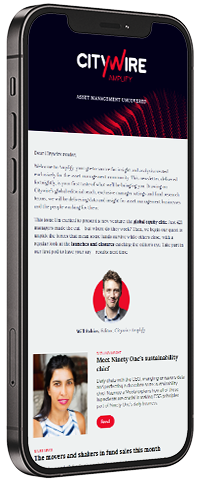There might be light at the end of the tunnel, but it ain’t here yet.
Does your fund manager pitch for business? They should

Latest Newsletter
Value stance rewards managers with first AAA rating
The year comes to a close with a host of managers gaining their AAA wings.
Real Life: A cheaper, smarter way to fly business to the US
Companies are clamping down on travel costs. Here’s how to travel in comfort while keeping the expenses department happy.
Community
A long time ago, during my pre-fund management career, I was sent on a team-building training course. During one exercise, we were given the following hypothetical scenario: the ship we were sailing in had started to sink, 30 objects had fallen into the water, and we had to gather them up in order of survival importance.
First, we ranked the items we would select as individuals. Then, we discussed and decided as a team what order to choose. The objective was to show that by working as a team we would achieve better results than if we were a collection of individuals.
In the first exercise, I scored the highest marks (not difficult when folk seemed to value sunscreen more highly than a life belt or bottled water). In the second exercise, the group score was higher than every individual score. Except mine. Conclusion – I would have a better chance of survival on my own! I’m glad to say I’ve never had to put that to the test.
Now, I dwelt on that for some weeks – I’m an introvert, that’s what we do. Was it just a fluke that placed me top? No, a better question was: why hadn’t I been able to convince the others that my selection was right?
Could I not communicate? Was I not a team player?
I assumed I needed to work on my communication skills – how could I get my ideas across, what did it take to get people to listen to me? And indeed, these things proved vital in later years, running a team of 30 multi-degree educated fund managers, dealing with clients across continental Europe.
Had I been more assured of my ability, perhaps I would have decided teamwork was not worth pursuing. Perhaps I would have turned more insular, and ended up as the proverbial analyst in the dark corner, with an ‘I am right, you are wrong’ attitude.
No. I was a team player. I had just not been the right fit for that particular team.
‘I’ve pitched and won against almost all the household names. Why? Maybe because instead of only sending a sales person or product specialist, we always sent the fund manager. And whenever possible they led the pitch.’
The bank I was working for had recently established an international payments division in Edinburgh. Initially, I phoned, then I wrote to the head of the division asking for a job.
I was asked for an interview and accepted – my interviewer remains a friend to this day. In truth, they needed 300 people; my chance of success was high. But importantly, I found my fit – my team.
This was a world where most days were different, where frequently we had to think on our feet. We were writing the process manual as we went along. Great days, stimulating days and days that ultimately led me to fund management.
Teamwork beats luck
One of the most underrated requirements of fund managers is teamwork.
I can offer plenty of platitudes about the analyst working with the manager, the specialist with the generalist to make solid investment decisions. That is not entirely what I mean.
A former CEO of mine put it this way: ‘We will excel at everything within our control. We will aim to excel at everything outside our control.’ Client service, support and general administration should never let us down. Performance, especially relative performance, is often in the lap of the gods.
Fund managers from the greenest of graduate trainees to the grandest of stars need to understand this. You might be the one making the investment decisions, you might even be making great investment decisions. But, to get that message across to potential clients, to win and retain those clients takes teamwork.
‘Massively underrated parts of the asset gathering process are fund manager visibility and administrative support.’
Most fund management organisations are structured along similar lines – front office, sales and marketing, and middle-office administration. (You could add a fourth: the back office. I had the pleasure of running a couple of back-office teams. Many of those functions have been contracted out now.)
There is often a distinct feeling that ‘never the three areas shall meet’. It can be quite formal. Often there are physical barriers, such as different floors of the same building for different functions, or even different locations altogether. I’ve worked in many offices where security clearance access to certain areas is restricted by job role, often unnecessarily.
Each of the three areas – front office, middle office, sales and marketing – tends to have different cultural references. Consciously or not, they also set non-physical barriers, often discouraging integration. Each sees themselves as special and not fully understood by their erstwhile colleagues.
- Fund managers can behave a bit like prima donnas (just a bit!), demanding support from other areas, accepting all the praise and blaming others for failures or lack of assets.
- Where AUM is paramount, sales and marketing believe they lead the way. After all, what good is a great process and performance if no one is aware of it?
- Middle-office workers feel put upon from all sides. Fund managers, clients, sales and regulators all demand their pound of flesh. And the pay isn’t great.
Before you write in, I know I’m generalising. However, I’m a rare beast. I’ve worked in all three divisions in my career. I’ve worked for companies large and small. And over the past 30 years, I’ve listened to colleagues and competitors alike – folk like to share with me for some reason. I think it’s the psychoanalyst’s beard.
There are undoubtedly exceptions. For example, in my experience, small tends to mean better integration. No surprise really, if everyone needs to muck in together at times to get the job done.
It is similar in most walks of life. I’d rather stay in a boutique hotel where the receptionist may call me by my name, than a luxury chain where bookings are done via a call centre. I’d rather deal with my local, independent car garage than just be a number on a main dealer worksheet. Don’t get me started on fast food chains. Even for the smallest asset manager, integration of function can still be difficult.
Asset gathering
Now, much as I’d love to share my thoughts on how to run the perfect fund management company, this next bit is aimed squarely at budding fund managers.
I’ve spent the past couple of decades as a fund manager. Around half of that time has also included seats on executive committees and management boards. That allowed me to study the different ways these relationships play out. Why within the same company do some fund managers seem to flourish, to gather assets, and others do not?
Personality plays a large part. I’m an introvert. The Myers Briggs test has me pinned as an INTP (introverted, intuitive, thinking, and perceiving) – I like hiding in dark corners, I over analyse and I can be way too serious. I am told my ‘type’ has a natural unwillingness or inability to communicate. That takes me back to the issue of demarcation: ‘Why should I talk to the client? That’s a salesperson’s job.’
It’s not a universal truth. There are some incredibly ebullient fund managers. Thing is, the industry seeks a type and has done since before I joined. Hence the personality profiling. I’m not talking about colour, gender or any other form of obvious and destructive discrimination, many of which are still too prevalent in our industry. The type I refer to is degree-educated, preferably in maths or economics, certainly numerate before literate, often introvert not extrovert, and likely to be found in the library rather than the student union.
Now, you are in a highly competitive, fee-pressured, largely homogeneous business. Client service is increasingly essential if for no other reason than as a differentiator.
Would you rather speak to a call centre or a specialist? Would you rather be number 100 in the queue or dealt with quickly and professionally? Service matters.
Fund managers are judged, and judge themselves, on AUM. Branding and a distribution machine clearly influence that. As does performance. Massively underrated parts of the asset-gathering process though, are fund manager visibility and administrative support. Bringing all three elements together highlights to clients that they have a whole organisation pulling in the same direction.
I’ve pitched to many an IFA for many a pension fund. I’ve pitched and won against almost all the household names. Why? Maybe I am a good presenter? Maybe we had the right product? Or maybe it’s because instead of only sending a salesperson or product specialist, we always sent the fund manager. And whenever possible they led the pitch.
Oh, and vital to our pitch proposition was client service: what the client could expect from us, how, what and when we would deliver.
My advice to eager asset-gatherers and budding fund managers: if you are happy in a dark corner, I understand. That is my natural domain. But please try to get out of it as often as you can. And if you think, or worse are told, selling is just for sales folk, or that admin will take care of itself, try to tear down those barriers.
Understand what your colleagues do and how important it is to work together. Get that message across to clients and you’ll have a head start on much of the competition.
Latest Newsletter
Amplify Issue 30: The fund groups topping the tree
We analyse which groups have had the biggest inflows and outflows in 2022, look at managers achieving their first AAA ratings, and hear from Rob Kyprianou on why regulation gets it back to front.
Amplify Issue 29: Red hot: 2022’s private market hiring spree
2022 has been a hot year for private markets, but are asset managers putting the brakes on their expansion efforts? Plus, we look at how the bear market has affected launches this year and look at how firms can better communicate their brand values.
Amplify Issue 28: Fill your ESG product gaps
We hear from fund buyers on what they’re looking for from an ESG fund, find out what Neuberger Berman is plotting in the alts world, and learn the winners of Citywire’s Gender Diversity Awards.
Community
